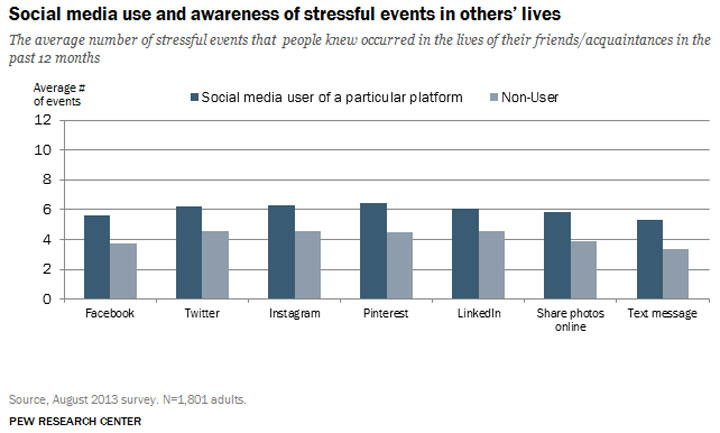TORONTO – Has your Facebook feed been chock-full of bad news lately? If so, you may be feeling more stress than usual. That’s the cost of caring, according to a new study from the Pew Research Center.

The study titled “Social Media and the Cost of Caring,” released Thursday, aimed to evaluate whether the use of social media and digital technology stressed users out.
But, in a twist, researchers discovered that stress isn’t associated with the frequency of people’s use of technology – nor are users stressed out by things like how many friends, likes or comments they have on social media.
Instead, users who reported high levels of stress are indirectly affected by the awareness of stressful events in their online friends’ lives.
READ MORE: ‘The Internet has no age limits’ – online harassment widespread Pew Research finds
“The relationship between stress and social media use is indirect. It is the social uses of digital technologies, and the way they increase awareness of distressing events in others’ lives, that explains how the use of social media can result in users feeling more stress,” reads the study.
In other words – stress is contagious.
Global News asked social media users if they had ever felt stressed out by what they read on social media – many answered yes.
“Too many sad news stories definitely stress me out and at times causes me to turn it all off and take a break from it for several days,” wrote Facebook user Louise Valiquette.
“After a day scanning through one depressing world news story after the other, I want to stick my head in the sand,” said Carole Thajer. “I’ve heard the arguments from friends and strangers, that it’s just Facebook and don’t take it so serious but this is how we get our news now.”
For its research, Pew surveyed 1,801 adults and asked them about how stressful they perceived their lives to be using an established scale of stress called the Perceived Stress Scale (PSS).
The scale is based on people’s answers to ten questions that assess whether they feel that their life is overloaded, unpredictable and uncontrollable. Participants responded with a four-point scale from “frequently” to “never.”

Get breaking National news
STRESS SCALE:
In the last 30 days, how often have you:
- Been upset because of something that happened unexpectedly
- Felt that you were unable to control the important things in your life
- Felt nervous and “stressed”
- Felt confident about your ability to handle any personal problems
- Felt that things were going your way
- Found that you could not cope with all the things that you had to do
- Been able to control irritations in your life
- Felt that you were on top of things
- Been angered because of things that were outside of your control
- Felt difficulties were piling up so high that you could not overcome them
Pew found that overall women tend to report more stress than men – but women who use a number of digital platforms tend to report less stress than women who don’t.
However, women are also more aware of stressful events in their friends and families’ lives – which may make them more prone to being affected by what they read on social media.
According to the study, a woman with an average amount of Facebook friends is aware of 13 per cent more stressful events in the lives of her closest social ties.
A typical male Facebook user who comments regularly on others’ posts is aware of eight per cent more stressful events among his closest social ties.
Global News found more women responded to our posts asking people about their stress levels online. Of the men that did comment, the majority said their stress levels weren’t affected by their Facebook friends’ personal problems.
But it’s not just friends that can stress us out online.
Many commenters pointed out that the number of “bad” news stories – such as the recent terror attacks in Paris – posted to social networks often becomes overwhelming. However, many said these stories made them feel sad as opposed to stressed.








Comments